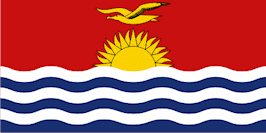Kiribati Foreign Relations
 Kiribati, geographically huge but dramatically under-resourced, straddling the equator for 3000 miles with a total population of 100,000, cannot sustain itself. Fiscal austerity and outside aid are essential. Kiribati is highly vulnerable to rising sea levels and global warming, and frequently lends its voice to calls for action on climate change. Kiribati currently faces the threat of being overrun by the rising seas. So the residents of this island nation are trying to seek refuge elsewhere. President Tong has been in talks with New Zealand about finding a new homeland for his people when atolls become inundated.
Kiribati, geographically huge but dramatically under-resourced, straddling the equator for 3000 miles with a total population of 100,000, cannot sustain itself. Fiscal austerity and outside aid are essential. Kiribati is highly vulnerable to rising sea levels and global warming, and frequently lends its voice to calls for action on climate change. Kiribati currently faces the threat of being overrun by the rising seas. So the residents of this island nation are trying to seek refuge elsewhere. President Tong has been in talks with New Zealand about finding a new homeland for his people when atolls become inundated.
Kiribati's major exports are copra, fish and seaweed. It also earns foreign exchange through remittances from the more than 200 workers who visit New Zealand each year on short-term labor contracts. Phosphate deposits on Banaba Island were the primary source of income until supplies were completely exhausted in 1979.
Kiribati is conducting an active foreign policy and taking an active part in regional organizations. In August of 1985, Kiribati, together with 10 states and 2 territories was one of the first to sign the agreement to make the South Pacific a nuclear-free zone at the meeting of the South Pacific Forum. The decision of the forum was applauded by progressive forces throughout the world.
Kiribati became a member of the United Nations in 1999, and in September 2003, President Tong requested authority from Parliament to establish a UN mission. Currently, however, Kiribati does not maintain a resident ambassador in New York, and its vote is typically cast by New Zealand in a proxy arrangement. Kiribati also is a member of the Pacific Islands Forum, Asian Development Bank, the Commonwealth, International Monetary Fund, the Pacific Community, and the World Bank. Kiribati is particularly active in the Pacific Islands Forum. The only Kiribati diplomatic missions overseas are a high commission in Fiji and an honorary consulate in Honolulu.
Kiribati maintains friendly relations with most countries and has particularly close ties to its Pacific neighbors - Japan, Australia, New Zealand, and Fiji. Australia, Taiwan, New Zealand, and Cuba maintain resident diplomatic missions in Kiribati.
New Zealand and Kiribati have a strong relationship based on geography and shared development interests. As a significant contributor to Kiribatiís social and economic development, and one of a select few countries with a fully-staffed resident diplomatic mission in Tarawa, New Zealand has a high level of impact in Kiribati. In recent years, New Zealand's foreign policy engagement has increased significantly as a result of Kiribatiís emergence as a leading voice within the Pacific on climate change issues and its increasing profile on regional and international issues of importance to New Zealand, such as regional fisheries management and conservation. As part of the Pacific Reset, New Zealand has scaled up its development cooperation in Kiribati. Kiribati faces serious development constraints that come with its size and remote location, but New Zealand is working closely with the government and people of Kiribati to overcome these challenges.
Multiple air-control centers covered portions of the vast Kiribati EEZ. The Fiji center controlled most air space over the Gilbert Islands group; and the FAA Oakland center controls most airspace over the Phoenix and Line Islands groups. Kiribati needs funding sources. It believed the Fiji center should share revenues, but Fiji refused to do so. Reportedly Australia and New Zealand have said that, if Kiribati can obtain the air-control rights in Fiji's hands, Australia and New Zealand would be willing to do the controlling, with the revenues flowing to Kiribati.
Ship owners looking for a flag of convenience can now hoist the colors of the tiny Pacific island nation of Kiribati, which amended its maritime shipping act in June 2006 to allow creation of a foreign ship registry. Singapore-based Sovereign Ventures Limited is the agent, as it is for Tuvalu and, reportedly a host of other nations. Sovereign Ventures has close and long-standing ties to North Korea. Sovereign is involved in oil and gas exploration in North Korea. Kiribati officials first mentioned the new ship-registration law to us last summer in the context of news accounts reporting a collision earlier in the year between U.S. and Kiribati-flagged ships in the Persian Gulf. Kiribati was certain none of its ships could be in the Gulf because the previous law allowed very limited registration. At the time false-flagging and other concerns would surely increase with an off-shore registry. The creation of the new registry was driven solely by the desire to tap a new source of foreign cash. The Secretariat of the Pacific Community tried to warn the Kiribati government away from the deal with Sovereign Ventures, whose owners were described as "pretty cunning."
|
NEWSLETTER
|
| Join the GlobalSecurity.org mailing list |
|
|
|

